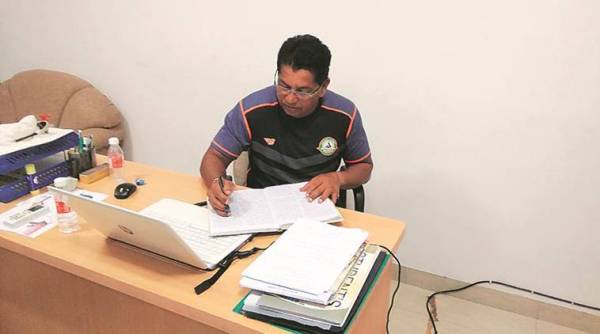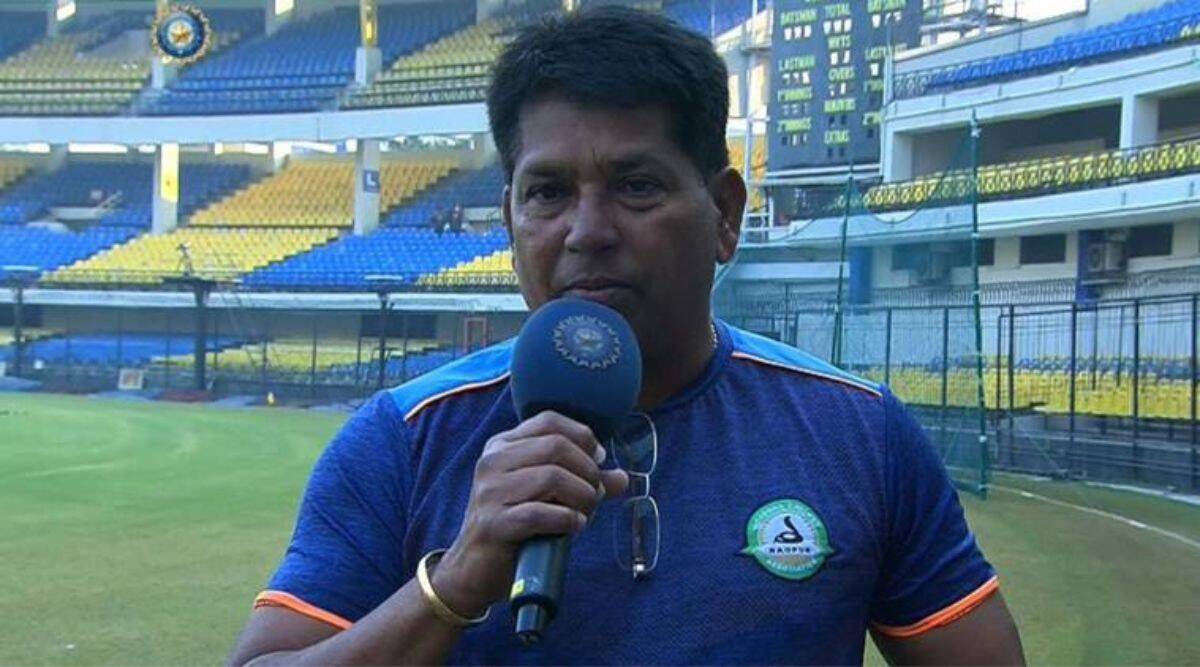Ex-Mumbai stalwart’s mantras of discipline and homework key in bringing success to unfancied teams.
Thank you for reading this post, don't forget to subscribe!Shared News: June 21, 2022 7:29:30 am
Having won back-to-back titles with then-unknowns Vidarbha three years ago, Pandit is now up against his ‘home’ team Mumbai, whom he coached to their last title in 2015-16. (File)
“There should be some fear in the player, otherwise he will not do what he is supposed to do. And he knows that if he does not act according to the plan, he will have to face Sir’s wrath,” veteran Madhya Pradesh fast bowler Ishwar Pandey says.
Planning and discipline – that, essentially, is coach Chandrakant Pandit’s philosophy. The former India wicketkeeper-batsman has guided another side not used to making summit clashes – Madhya Pradesh in this case – to their first Ranji Trophy final in 23 years. Having won back-to-back titles with then-unknowns Vidarbha three years ago, Pandit is now up against his ‘home’ team Mumbai, whom he coached to their last title in 2015-16.
Pandit is famed for his hard-taskmaster style, and painstakingly-prepared plans that brook little interference from either captain or bowler. During a Ranji semi-final against Karnataka, he had taken away the phones of the Vidarbha players, worried that they might keep checking them late into the night and lose focus. There are tales of him not being averse to slapping the odd player who broke a law he’d laid down. It is this aspect of his coaching that gets played up the most, but there is doubtless a method behind the remote control, and it has worked for years now.

Pandit is famed for his hard-taskmaster style, and painstakingly-prepared plans that brook little interference from either captain or bowler. (File)
“Both go hand in hand, the planning and discipline,” says former India and Mumbai all-rounder Abhishek Nayar, who played under Pandit’s coaching. “All his plans require a certain amount of skill and discipline. He tries to incorporate certain life skills that will help players on the field. Ranji Trophy is a format in which each person can play a role and you can control the game. He understands and assigns roles to players very early in the season. But to fulfil those roles, be it playing a certain number of balls, or playing in a certain style, his ideology of discipline comes into play.
“It also goes hand in hand with the analytical work on what the opponents have done in the past and what they do now,” Nayar adds. “He (Pandit) needs freedom to pick the kind of players he wants and then he gets the results that are desired by the association.”
Both Vidarbha Cricket Association and now the Madhya Pradesh Cricket Association have given Pandit the leeway to run a tight ship, and have reaped benefits.
“Chandu developed the entire strategy and planned the practice sessions,” former India opener Wasim Jaffer, who was part of the victorious Vidarbha side, had told this correspondent once. “He gave everyone confidence. Kisiko pyaar se samjhaana, kisiko daantke samjhaana [Convince some with love, some with scolding].
“That is the role of the coach. It is nothing new for him, he has been doing it for so many years. And Vidarbha needed somebody like that,” Jaffer had said. “Today’s youngsters need someone to pull them out of their comfort zone and he did that to a great extent, without a doubt.”
Tough act to follow
It is a tight rope some other domestic coaches have tried to walk, unsuccessfully. Push too hard, and one can lose the respect of the dressing room. Nayar does not see that happening with Pandit. “Because he takes responsibility for his actions and does not blame the player when things go wrong,” Nayar says. “If you follow him blindly and fail, most likely he will take responsibility. That gives a player security. And when you keep playing finals, you obviously grow as a player.”
Pandey, who took 11 wickets at an average of 20 until he got injured before the knockouts, was one who benefited from following Pandit’s instructions. Into his 12th year of first-class cricket, Pandey says he enjoyed the “very different experience” from what he’s had till then in his career.
“He is excellent at reading players. He’ll assess the strong and weak points of an opposition batsman and then make us bowl accordingly. So it becomes easier for us, and we don’t have to try too hard to make things happen,” Pandey says.
“I am someone who operates more on a disciplined line and length rather than looking to attack. So, he says you have three options for dismissals – bowled, caught behind and leg-before. Just keep bowling on a proper length, that is essentially what red-ball cricket is about anyway. And bowlers who have more pace than me, such as Puneet (Datey), (Gaurav) Yadav and Kuldeep (Sen), they have a different role obviously.”
Of course, there is to be no swaying on the field from the path set by Pandit, unless he himself sends in a word asking for a change in tactics.
“The planning is done in front of everyone and the team follows it, ki bhai ye karna hai aur kaam khatam [we have to do this, and nothing else]. It is not like the bowler will do what is in his mind and the captain will be thinking about something else,” Pandey explains.
“Like if you have to keep a fielder at a certain position, you have to. It may take some time to get the result, but the process has to be gone through. If it doesn’t work, he’ll send in a message with another plan. He relies a lot on messages, that something is going to happen now, so change the field for this delivery, and so on.
A fine all-round bowling display from Madhya Pradesh helped them complete a 174-run win over Bengal on Day 5 of the @Paytm #RanjiTrophy #SF1 & secure a place in the #Final. 👏 👏 #BENvMP
Watch the highlights 🎥 🔽https://t.co/R9isgIJcDQ pic.twitter.com/7R3192utoV
— BCCI Domestic (@BCCIdomestic) June 18, 2022
“Sir asks us to stick to the basics of the game, and not try to think too much,” Pandey says.
The downside to this micromanagement approach is that those who are used to thinking and expressing their thoughts too much might at times find it hard to fit into this environment. And those who have become used to being fed plans may never grow enough to start thinking on their feet.
“See, there are many players who also operate at their best under instructions from others. Some, in fact, derive motivation from getting instructions as they are dependent on inputs from others,” says former Madhya Pradesh captain Devendra Bundela, who was the side’s batting coach before Pandit took over.
“He (Pandit) has his own way of thinking, but his overall understanding of the game is remarkable,” Bundela adds. “There may be some who don’t like his working style but then, he also gives you the results, and you can’t really argue against that.”
Says Nayar: “For every good, there is a bad. A player who wants to grow will grow, and a player who doesn’t want to will not. I always say if everything is good about someone, he is not trying to make an impact, he is just trying to be in the system long enough to survive.
“Chandu sir is a very brave person, he takes the onus on himself to control all the controllables. And the results he has given over the years just prove that there are a lot more pros than cons to his style of coaching.”
Unique style
Nayar, who was into the last quarter of a stellar domestic career when Pandit coached Mumbai, says that his takeaway was how Pandit used discipline to bring the players together. “Sometimes you can be the villain in the team, and that can help the team get together. And he is happy doing that, being this strong headmaster and everyone rallies against him. Not a lot of people can do that. He does not play safe,” says Nayar.
The last time MP played the final, in 1998-99, Pandit was their captain. A young Bundela, who would go on to become the third-highest run-getter in Ranji Trophy history, was part of that side, and remembers the backing he got from his skipper.
“You have to give confidence to players, especially the young ones, who can be hesitant to begin with and can easily get overwhelmed. If they get support at the start, it makes a lot of difference to them,” says Bundela.
“I remember when I was young, Chandu bhai supported me a lot, ki jaao aur bindaas khelo [just go out and play freely]. His presence has made a lot of difference to this team; in the past couple of years, their self-belief and confidence has increased after talking to him,” Bundela adds. “Nothing is possible without hard work, and he has been doing exactly that in the background with this team.”
Pandit has himself acknowledged in the past that his methods might not work at international level, but Nayar calls him the Ranji Trophy “king”.
“No one can come close to him there. He has figured out how to win championships,” Nayar says. “It is one thing to win a championship with a strong team, it is another to win with a team that has never won before. He is undoubtedly the best first-class coach in India.”




